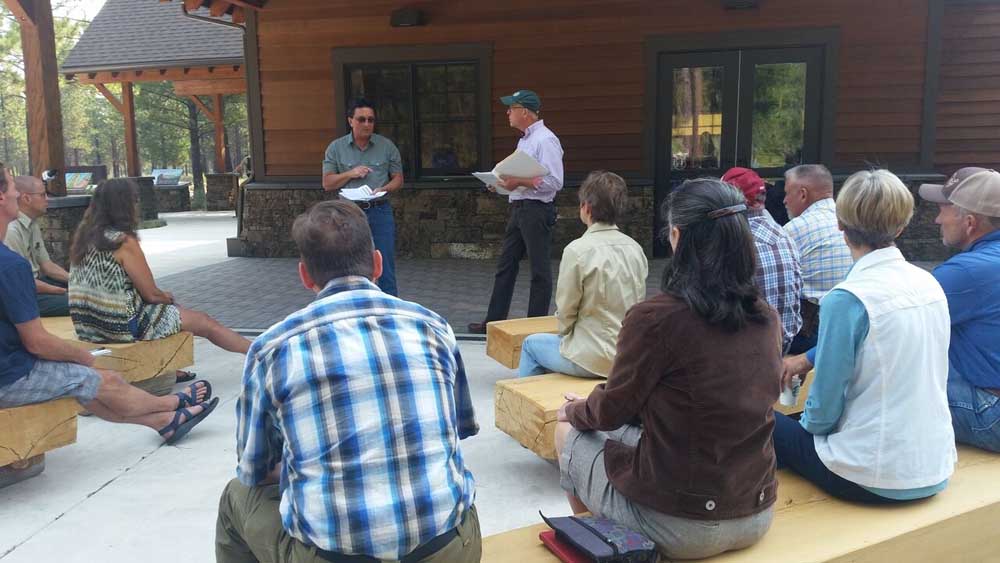Walden gathers input on wilderness permit plan
Published 5:11 am Thursday, August 10, 2017

- John Allen, forest supervisor for the Deschutes National Forest, and Oregon Rep. Greg Walden talk during a meeting Tuesday at the Cascade Lakes Welcome Station. Walden called the meeting to discuss a proposal to permit popular wilderness areas.(Kyle Spurr/Bulletin photo)
Skyrocketing visitation to the region’s wilderness areas is leading the U.S. Forest Service to consider a proposal that could require paid permits to access the many trails.
The idea of limiting access to public lands does not sit well with Rep. Greg Walden, R-Ore., although he understands the burden the crowds have on the forest.
Walden called a meeting Tuesday at the Cascade Lakes Welcome Station near Bend to talk with Forest Service officials and community stakeholders about the proposal.
“I wasn’t sure what to expect when you are talking about a new permitting system and fees. People can get their hackles up,” Walden said. “My takeaway was there is a sweet spot here to get appropriate management so we don’t destroy a very fragile environment nor the experience people seek.”
The Deschutes National Forest is considering requiring prepurchased permits to enter the Three Sisters Wilderness from two dozen trailheads off the Cascades Lake Highway and four trailheads off the McKenzie Highway. In addition, 13 trailheads entering the Mount Jefferson Wilderness could also be affected.
John Allen, forest supervisor for the Deschutes National Forest, said the Deschutes and Willamette national forests are working together on the proposal and could have a draft decision released by early 2018. Any final decision to launch a paid permit system would not be made until 2019, Allen said.
At the Tuesday meeting, Allen shared some statistics showing how much visitor use has grown in the national forest. In 2007, the Deschutes National Forest had about 3 million visits. After a dip to 2.5 million visitors per year during the Great Recession, the number of visitors this year could reach 4 million.
“You look at where we were at 10 years ago and where we are now. The recreating public and community is certainly coming back and enjoying their public lands,” Allen said.
As for specific wilderness areas, the Three Sisters Wilderness had 25,000 visitors in 2011. Last year, the wilderness area had 90,000 visitors, according to the Deschutes National Forest.
In 2015-16, Three Sisters Wilderness rangers had to haul out more than 1,200 pounds of garbage and on 830 occasions had to clear buried human waste..
“What we are having to do is look at how we are going to maintain that wilderness character and these beautiful landscapes given the trajectory of use we are seeing,” Allen said.
At the meeting, Walden invited input from various groups including the Bend Chamber of Commerce, Visit Bend, Oregon Equestrian Trails, Back Country Horsemen of Oregon and the Pacific Crest Trail Association.
Kevney Dugan, Visit Bend executive director, said his tourism agency would support a permit system if it helped manage the most popular trails, and started encouraging people to spread out to other less used areas in the region.
Forest Service officials have previously said it is possible that paid permits would only be required on the most heavily used trails that create the most environmental damage.
Most of all, Dugan said, Visit Bend is interested in helping encourage visitor education. The agency has already launched the “Visit Like a Local,” campaign that address some of the concerns in the wilderness areas.
“I think there are a lot of ways we can re-educate the public and take care of our public lands and ensure 20 years down the road we still have that experience we have today that we are so proud of,” Dugan said.
Back Country Horsemen of Oregon President Jerry Bentz said at the meeting his group is not as worried about paid permits as they are about ensuring trail maintenance is consistently done.
Forest Service officials have said part of the proposal would make sure funds from the permits go toward local maintenance projects.
Bentz said the nonprofit group of horseback riders in Oregon’s backcountry and other hikers and bikers are not able to access some trails because they are overused and not maintained.
“We are forcing everybody into a smaller and smaller and smaller area,” Bentz said.
At the end of the meeting, Walden said he enjoyed hearing all the different perspectives. He described the wilderness areas as unique — they do not allow bicycles or vehicles.
To keep the wilderness areas tranquil and not have thousands of people on the same trails at the same time, Walden acknowledged there may be need for a plan that limits the number of people.
“We all love and treasure our public lands,” Walden said. “We just don’t want to use them, and love them to death.”
— Reporter: 541-617-7820,
kspurr@bendbulletin.com






